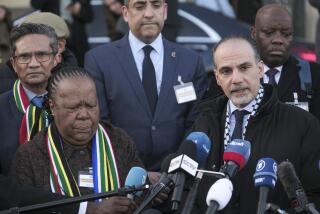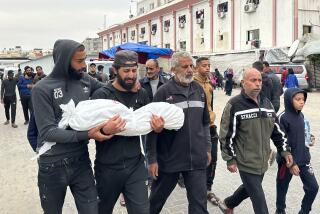Top S. African Official Discounts U.N. Sanctions Call
- Share via
JOHANNESBURG, South Africa — As the number of people held under South Africa’s week-old state of emergency passed 1,000 Saturday, the Pretoria government rebuffed the U.N. Security Council’s resolution against apartheid and scoffed at the voluntary sanctions that the peacekeeping international body called for.
Foreign Minister Roelof F. (Pik) Botha declared that “until peace and order is restored in all areas, the government will not allow the instigators of violence to succeed in their goal,” and he dismissed the Security Council’s condemnation of South Africa and its call for worldwide sanctions as “invalid.”
Little Compliance Seen
“The South African government rejects this (U.N.) resolution,” Botha said, predicting that its call for limited economic sanctions--including a freeze on new investments here, an end to government-guaranteed export loans and a ban on the importing of Krugerrands--will be ignored by most of his country’s black-ruled neighbors and major trading partners.
“Our differences are not so great that we cannot resolve them among ourselves,” the longtime diplomat continued, urging South African blacks to accept President Pieter W. Botha’s offer of political negotiations on the country’s future.
The U.N. vote should unite South Africans of all races, he said, and encourage discussions on the country’s future.
But proposed discussions between President Botha and Bishop Desmond Tutu, winner of the Nobel Peace Prize for his nonviolent campaign against South Africa’s policy of racial separation, ran into serious difficulties Saturday.
Blacks Criticize Tutu
Tutu came under pressure from other blacks, who felt that he had assumed the role of spokesman without a full mandate from the black community. And the president’s aides insisted that the black prelate must come as a member of an Anglican Church delegation or await “an appointment at the president’s convenience.”
Perhaps acknowledging the pitfalls inherent in such talks, Tutu said: “As the astute politician he is, (Botha) may be merely wanting to use this (proposal of a meeting) as an indication to the world that he is not intransigent, not unreasonable. I hope, however, that he would not play such games.”
Tutu said he has “no mandate, as it were, from the black community to negotiate on their behalf, and I am not going to do so.” He added: “I would just go in to say (to Botha) that we need statesmanship now, that there is a very real possibility of moving forward instead of playing marbles and fiddling while our Rome burns.”
But the prevailing attitude in government circles Saturday was that the state of emergency, decreed a week ago by President Botha in an attempt to bring a year of sustained civil strife to an end, has proven successful and now is not the time to make concessions, either to domestic or foreign critics.
‘We Don’t Care’
“The whole world can take its righteous indigination and stuff it--we don’t care,” a deputy Cabinet minister told diplomats and foreign journalists at a Pretoria lunch. “We have to deal with the problems of this country, and we don’t need the advice of the failures of the Western world.”
National police headquarters reported no significant incidents Saturday. A 20-year-old man was seriously wounded late Friday when he and a companion tried to firebomb the home of a black policeman in the eastern region of Cape province and was shot, police said.
In their continuing arrests of anti-apartheid activists, police said they detained an additional 176 people, bringing to 1,086 the total number detained since last Sunday under the emergency regulations.
More to Read
Sign up for Essential California
The most important California stories and recommendations in your inbox every morning.
You may occasionally receive promotional content from the Los Angeles Times.













